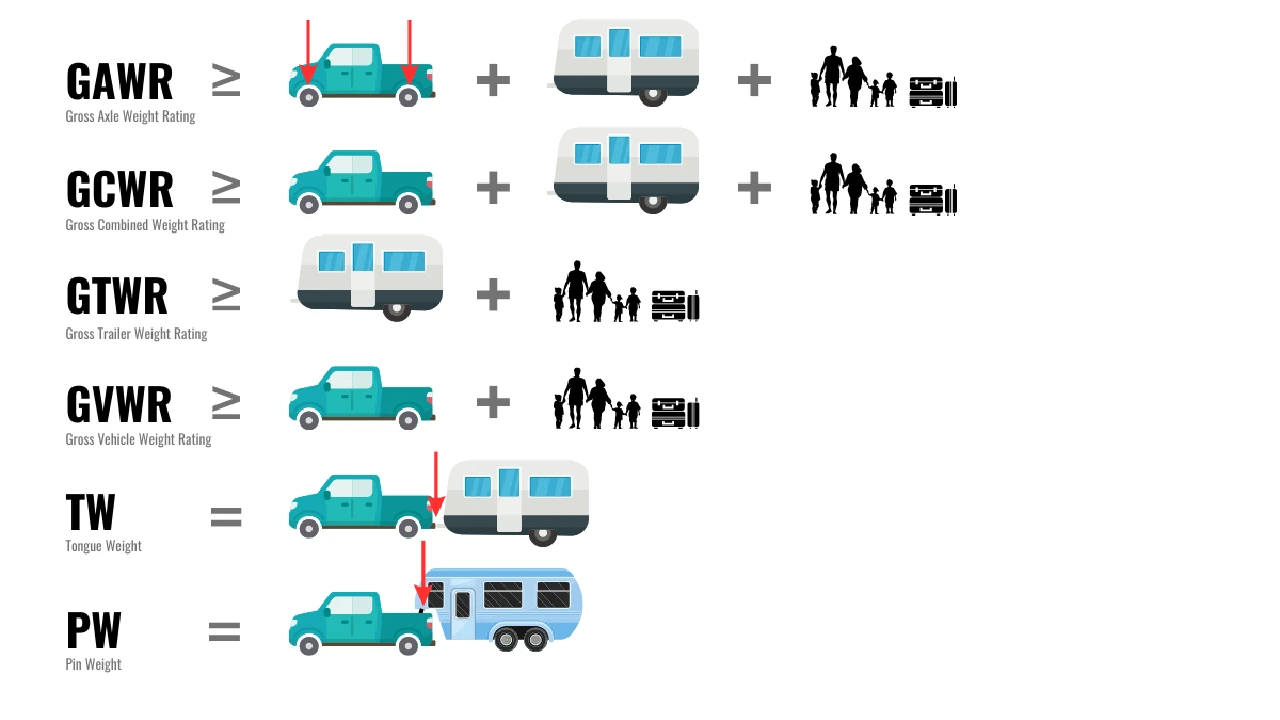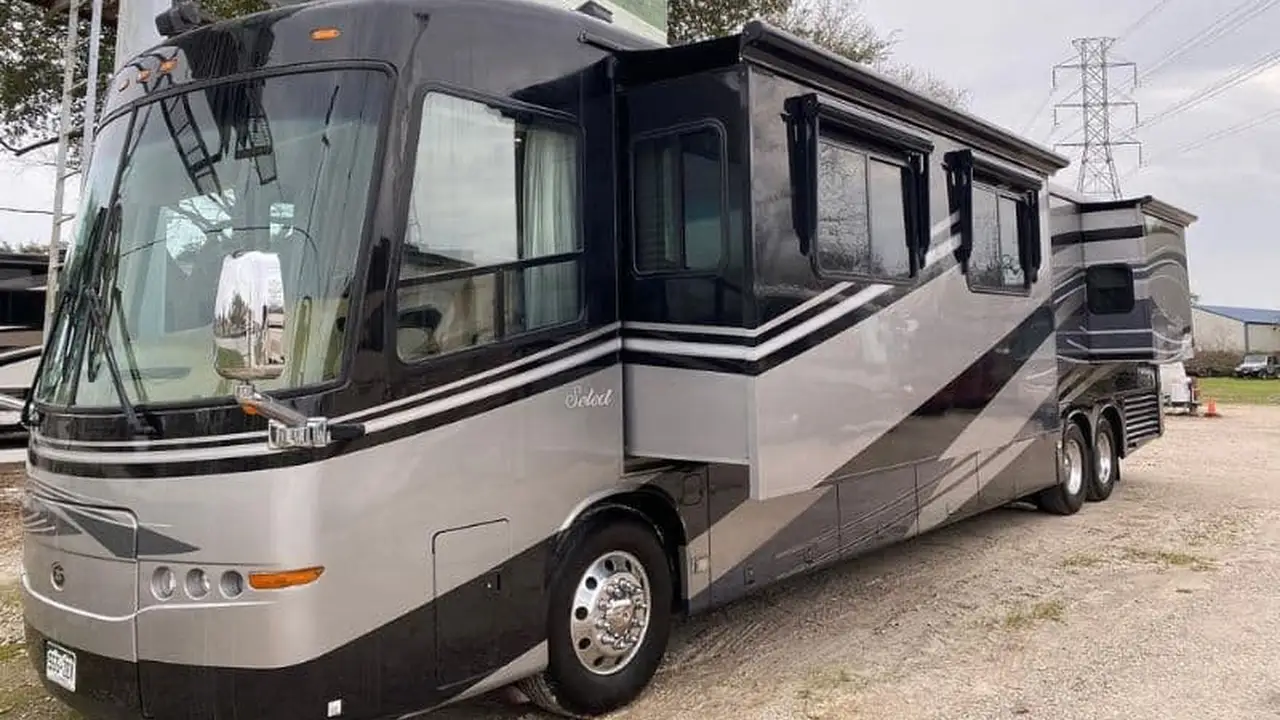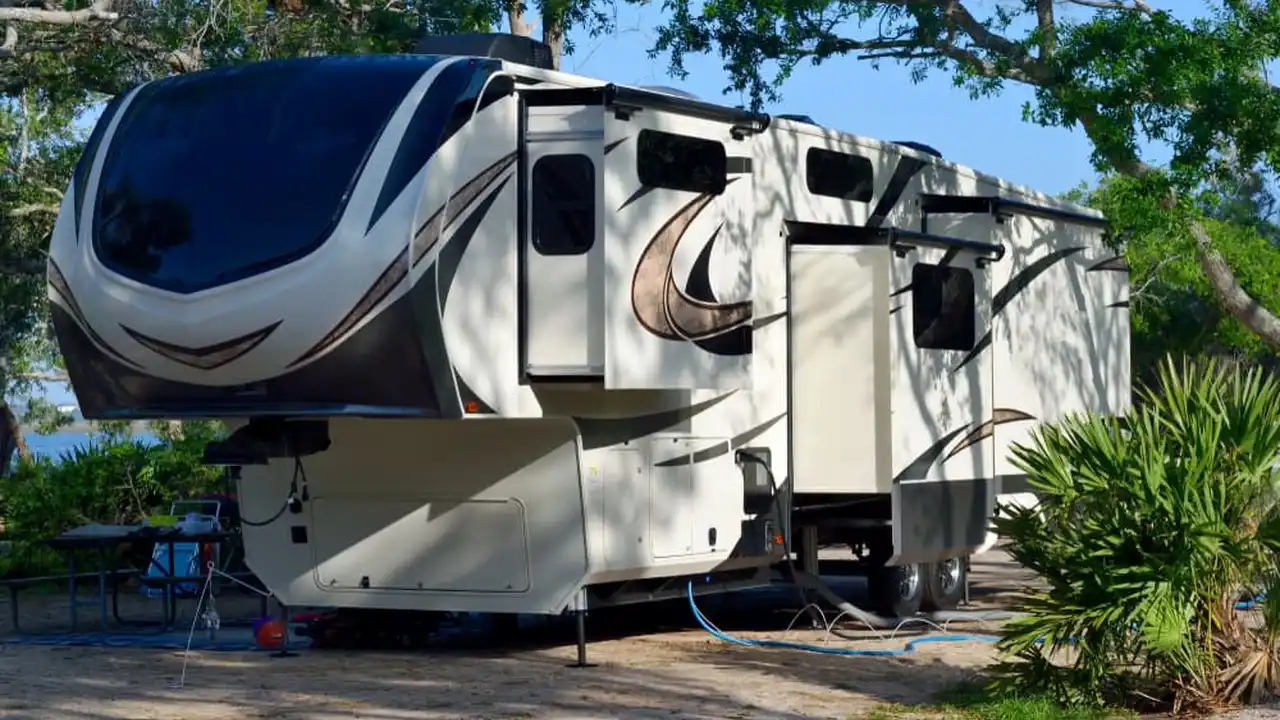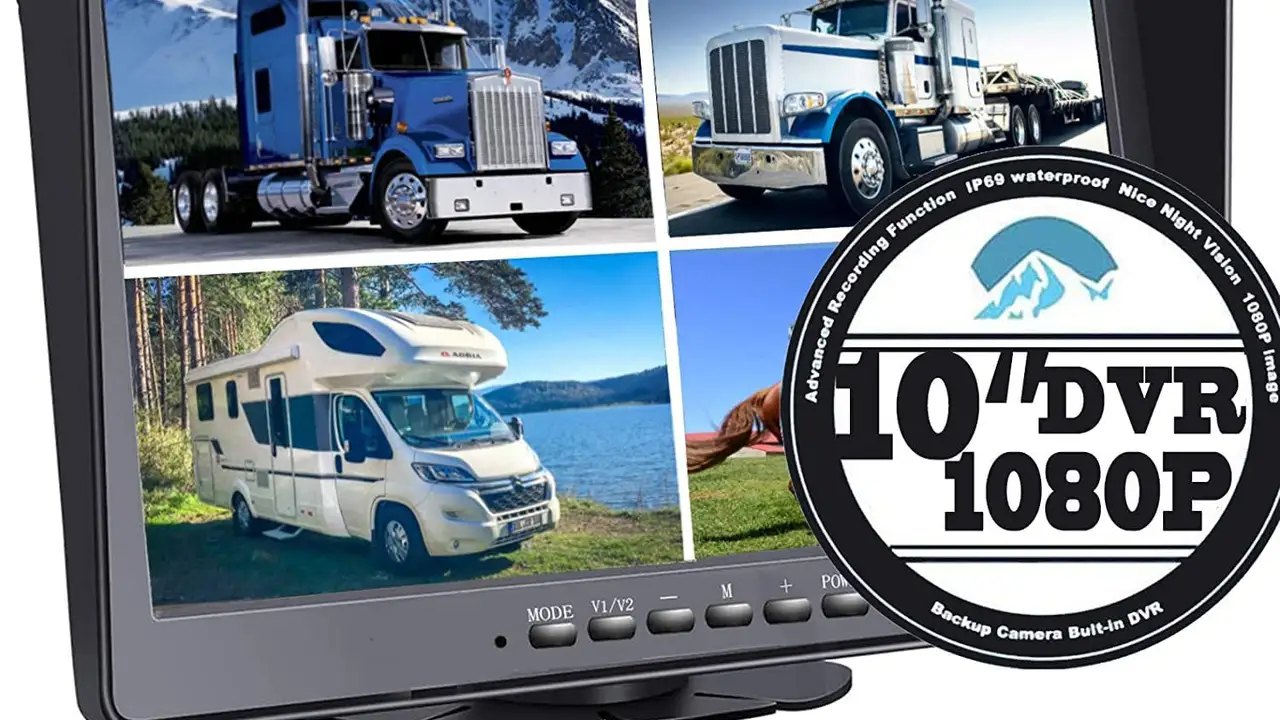RV Weight Ratings: Understanding GVWR, GCWR, and More

Understanding RV Weight Ratings A Comprehensive Guide
So you're thinking about buying an RV That's awesome RVing is a fantastic way to explore the country and enjoy the great outdoors But before you jump in you need to understand something crucial RV weight ratings Ignoring these ratings can lead to serious safety issues mechanical problems and even legal trouble
This guide will break down everything you need to know about RV weight ratings including GVWR GCWR and more We'll cover what these terms mean why they're important and how to make sure you're staying within your RV's limits We'll also look at specific product recommendations use cases product comparisons and pricing information to help you make informed decisions
GVWR Gross Vehicle Weight Rating Explained
Let's start with the basics GVWR stands for Gross Vehicle Weight Rating This is the maximum permissible weight of your RV when it's fully loaded That includes everything the RV itself all your gear passengers water propane and even the weight of the hitch if you're towing something
Think of it like this The GVWR is the absolute maximum weight your RV is designed to handle Exceeding it puts a strain on the chassis suspension brakes and tires leading to potential failures and safety hazards
Why is GVWR Important
- Safety Overloading your RV significantly reduces its braking performance and handling making it more difficult to control in emergency situations
- Mechanical Issues Exceeding the GVWR can damage your RV's suspension axles tires and other components leading to costly repairs
- Legal Consequences In some states it's illegal to operate an RV that exceeds its GVWR You could face fines and penalties
- Insurance If you're involved in an accident while exceeding your GVWR your insurance company may deny your claim
Finding Your RV's GVWR
Your RV's GVWR is usually found on a sticker or placard located near the driver's seat or on the RV's exterior It's also typically listed in the owner's manual Make sure you know your GVWR and keep it in mind when loading your RV
GCWR Gross Combined Weight Rating Demystified
Now let's talk about GCWR GCWR stands for Gross Combined Weight Rating This is the maximum permissible weight of your RV and anything it's towing combined This applies if you're towing a car a boat or another trailer
The GCWR takes into account the GVWR of your RV plus the weight of the towed vehicle and everything in it Just like with GVWR exceeding your GCWR can have serious consequences
Why is GCWR Important
- Safety Overloading your RV and tow vehicle can severely impact braking performance acceleration and stability especially on hills or in windy conditions
- Mechanical Stress Exceeding the GCWR puts excessive strain on your RV's engine transmission brakes and frame leading to premature wear and potential failures
- Fuel Efficiency Towing more weight than your RV is designed for will significantly reduce your fuel economy
Finding Your RV's GCWR
Similar to GVWR your RV's GCWR is usually found on a sticker or placard near the driver's seat or in the owner's manual Be sure to consult this information before towing anything with your RV
UVW Unloaded Vehicle Weight Understanding the Base Weight
UVW stands for Unloaded Vehicle Weight Sometimes also referred to as dry weight This is the weight of the RV as it leaves the factory without any fluids (water propane) or cargo This number is important as it serves as a starting point for calculating how much stuff you can actually bring with you without exceeding your GVWR or GCWR
Why is UVW Important
- Determining Cargo Capacity By subtracting the UVW from the GVWR you can calculate your RV's cargo capacity This tells you how much weight you can add in the form of passengers gear water and propane
- Comparing RV Models UVW can be a useful metric when comparing different RV models If you're trying to stay within a certain weight limit you'll want to choose a model with a lower UVW
Finding Your RV's UVW
The UVW is usually found on the same sticker or placard as the GVWR and GCWR It's also typically listed in the owner's manual Keep in mind that the UVW is just a starting point The actual weight of your RV will vary depending on the options and accessories that were added at the factory
CCC Cargo Carrying Capacity Maximizing Your Payload
CCC stands for Cargo Carrying Capacity This is the maximum weight of all your stuff that you can safely carry in your RV including passengers water propane food clothing and other personal belongings
Calculating Your RV's CCC
The CCC is calculated by subtracting the UVW (Unloaded Vehicle Weight) from the GVWR (Gross Vehicle Weight Rating) This number is crucial for ensuring you don't overload your RV
Why is CCC Important
- Preventing Overloading Knowing your CCC helps you avoid exceeding your RV's weight limits which can lead to safety issues and mechanical problems
- Planning Your Trips Understanding your CCC allows you to plan your trips more effectively You can prioritize what to bring and leave behind unnecessary items
Tips for Maximizing Your CCC
- Pack Light Be mindful of the weight of everything you bring Opt for lightweight camping gear and clothing
- Travel with Empty Tanks If possible travel with your water tanks empty and fill them up when you reach your destination Water is heavy and adds significant weight
- Weigh Your RV The best way to know if you're within your weight limits is to weigh your RV at a certified scale This will give you an accurate reading of your RV's actual weight
GAWR Gross Axle Weight Rating Ensuring Axle Safety
GAWR stands for Gross Axle Weight Rating This is the maximum weight that each axle of your RV is designed to carry It's important to distribute weight evenly across your RV to avoid exceeding the GAWR for either axle
Why is GAWR Important
- Preventing Axle Failure Exceeding the GAWR can overload the axle bearings suspension and tires leading to premature wear and potential failure
- Maintaining Stability Uneven weight distribution can affect your RV's handling and stability making it more difficult to control
Finding Your RV's GAWR
The GAWR for each axle is usually found on the same sticker or placard as the GVWR and GCWR It's important to pay attention to both the front and rear GAWR
Tongue Weight Understanding Towing Dynamics
Tongue weight is the amount of weight that the trailer tongue exerts on the hitch of the tow vehicle It's a crucial factor in ensuring safe and stable towing
Why is Tongue Weight Important
- Preventing Sway Proper tongue weight helps prevent trailer sway which can be dangerous and difficult to control
- Ensuring Stability Adequate tongue weight improves the overall stability of the tow vehicle and trailer combination
Calculating Tongue Weight
Ideally the tongue weight should be between 10% and 15% of the trailer's total weight You can use a tongue weight scale to measure the actual tongue weight
Hitch Weight Matching Hitches to Trailers
Hitch weight refers to the maximum weight that a particular hitch is designed to handle It's essential to choose a hitch that is rated for the weight of your trailer
Why is Hitch Weight Important
- Preventing Hitch Failure Using a hitch that is not rated for the weight of your trailer can lead to hitch failure which can be catastrophic
- Ensuring Safety A properly rated hitch ensures that the trailer is securely connected to the tow vehicle
Choosing the Right Hitch
When choosing a hitch make sure it is rated for at least the GVWR of your trailer Consult with a professional if you are unsure which hitch is right for your setup
RV Weight Scales Finding Certified Weigh Stations
The best way to ensure that you are within your RV's weight limits is to weigh it at a certified scale These scales are typically found at truck stops or weigh stations
Why Use RV Weight Scales
- Accuracy Certified scales provide an accurate reading of your RV's actual weight
- Peace of Mind Weighing your RV gives you peace of mind knowing that you are operating within safe limits
Finding a Certified Scale
You can find certified scales by searching online or asking at truck stops or RV dealerships
RV Weight Distribution Systems Enhancing Towing Stability
A weight distribution system helps to distribute the weight of the trailer evenly across the axles of the tow vehicle and trailer This can improve handling stability and braking performance
Why Use a Weight Distribution System
- Improved Handling Weight distribution systems can reduce sway and improve steering control
- Enhanced Stability By distributing weight evenly these systems improve the overall stability of the tow vehicle and trailer combination
- Better Braking Weight distribution systems can help to improve braking performance by keeping all tires in contact with the road
Choosing a Weight Distribution System
When choosing a weight distribution system make sure it is rated for the weight of your trailer Consult with a professional to determine which system is right for your setup
RV Tire Pressure Monitoring Systems TPMS Ensuring Tire Safety
A Tire Pressure Monitoring System (TPMS) monitors the air pressure in your RV's tires and alerts you if the pressure drops too low This can help to prevent tire blowouts and improve fuel economy
Why Use a TPMS
- Preventing Blowouts Low tire pressure can lead to tire blowouts which can be dangerous and costly
- Improving Fuel Economy Maintaining proper tire pressure can improve fuel economy
- Extending Tire Life Proper tire pressure can extend the life of your tires
Choosing a TPMS
There are many different TPMS systems available Choose one that is reliable and easy to use
Best RV Weight Scale Recommendations Product Reviews and Pricing
Here are a few recommendations for RV weight scales along with product reviews and pricing information Please note that prices can vary depending on the retailer and availability
REI Co-op MultiTowel Lite
- Description A lightweight and compact digital scale perfect for weighing smaller items or individual corners of your RV
- Use Case Ideal for checking the weight of individual storage compartments or ensuring even weight distribution
- Product Comparison More portable than larger platform scales but less accurate for overall RV weight
- Pricing Approximately $30
Sherline Products LM 2000 Digital Scale
- Description A robust and accurate digital scale designed for weighing larger items and trailers
- Use Case Suitable for weighing the tongue weight of your trailer or checking the overall weight of smaller RVs
- Product Comparison More accurate and durable than smaller scales but more expensive
- Pricing Approximately $250
CAT Scale
- Description A network of certified truck scales located at truck stops across the country
- Use Case The most accurate way to weigh your entire RV ensuring you are within all weight limits
- Product Comparison Not a physical product to purchase but a service to utilize for accurate weighing
- Pricing Approximately $12 - $15 per weigh
Top RV Tire Pressure Monitoring Systems TPMS Product Reviews and Pricing
Here are a few recommendations for RV TPMS systems along with product reviews and pricing information
TireMinder A1A RV Tire Pressure Monitoring System
- Description A popular and reliable TPMS that monitors tire pressure and temperature
- Use Case Suitable for all types of RVs including trailers and motorhomes
- Product Comparison Offers real-time monitoring and alerts for low pressure high temperature and rapid pressure loss
- Pricing Approximately $300 - $400
EEZTire TPMS6 Tire Pressure Monitoring System
- Description A user-friendly TPMS that is easy to install and program
- Use Case Ideal for RVers who want a simple and affordable TPMS
- Product Comparison Provides basic tire pressure and temperature monitoring with a clear display
- Pricing Approximately $200 - $300
TST Truck System Technologies 507 Series TPMS
- Description A high-end TPMS that offers advanced features such as customizable alerts and remote monitoring
- Use Case Suitable for RVers who want the most comprehensive tire monitoring system
- Product Comparison Provides detailed tire information and allows for remote monitoring via a smartphone app
- Pricing Approximately $400 - $500
Recommended RV Weight Distribution Hitches Product Reviews and Pricing
Here are a few recommendations for RV weight distribution hitches along with product reviews and pricing information
Equal-i-zer 4-Point Sway Control Hitch
- Description A popular weight distribution hitch that provides excellent sway control
- Use Case Suitable for towing trailers of all sizes
- Product Comparison Offers superior sway control and weight distribution compared to other hitches
- Pricing Approximately $600 - $800
Reese Strait-Line Weight Distribution System
- Description A reliable weight distribution hitch that is easy to install and adjust
- Use Case Ideal for RVers who want a simple and affordable weight distribution hitch
- Product Comparison Provides good weight distribution and sway control at a reasonable price
- Pricing Approximately $400 - $600
Blue Ox SwayPro Weight Distributing Hitch
- Description A high-quality weight distribution hitch that offers smooth and quiet operation
- Use Case Suitable for RVers who want a premium weight distribution hitch with advanced features
- Product Comparison Provides excellent weight distribution sway control and a quiet ride
- Pricing Approximately $700 - $900
Practical RV Weight Management Tips for Safe Travels
Now that you understand RV weight ratings let's talk about some practical tips for managing your RV's weight
- Weigh Your RV Regularly As mentioned earlier the best way to know if you're within your weight limits is to weigh your RV at a certified scale Do this before every major trip and after making any significant changes to your load
- Distribute Weight Evenly Distribute weight evenly throughout your RV to avoid overloading any one axle or side This will improve handling and stability
- Pack Light Be mindful of the weight of everything you bring Leave behind unnecessary items and opt for lightweight alternatives whenever possible
- Travel with Empty Tanks If possible travel with your water tanks empty and fill them up when you reach your destination Water is heavy and adds significant weight
- Monitor Tire Pressure Regularly check your tire pressure and inflate your tires to the recommended pressure This will improve fuel economy and extend tire life
- Consider a Weight Distribution System If you're towing a trailer consider using a weight distribution system to distribute weight evenly across the axles of the tow vehicle and trailer
Understanding RV Weight Stickers Deciphering the Information
RV weight stickers contain a wealth of information about your RV's weight ratings Let's take a closer look at what each of these numbers means
- GVWR (Gross Vehicle Weight Rating) The maximum permissible weight of your RV when fully loaded
- GCWR (Gross Combined Weight Rating) The maximum permissible weight of your RV and anything it's towing combined
- UVW (Unloaded Vehicle Weight) The weight of the RV as it leaves the factory without any fluids or cargo
- CCC (Cargo Carrying Capacity) The maximum weight of all your stuff that you can safely carry in your RV
- GAWR (Gross Axle Weight Rating) The maximum weight that each axle of your RV is designed to carry
By understanding these numbers you can make informed decisions about how to load your RV and ensure that you're staying within safe limits
RV Overloading Consequences Risks and Dangers
Overloading your RV can have serious consequences Let's take a look at some of the risks and dangers
- Reduced Braking Performance Overloading your RV significantly reduces its braking performance making it more difficult to stop in an emergency
- Poor Handling Overloading can make your RV unstable and difficult to control especially in windy conditions or on uneven roads
- Tire Blowouts Overloaded tires are more likely to blow out which can lead to accidents
- Mechanical Failures Overloading can damage your RV's suspension axles brakes and other components leading to costly repairs
- Legal Penalties In some states it's illegal to operate an RV that exceeds its weight limits You could face fines and penalties
- Insurance Issues If you're involved in an accident while exceeding your RV's weight limits your insurance company may deny your claim
RV Weight FAQs Answering Common Questions
Here are some frequently asked questions about RV weight ratings
What happens if I exceed my RV's GVWR
Exceeding your RV's GVWR can lead to safety issues mechanical problems and legal penalties
How can I weigh my RV
You can weigh your RV at a certified scale typically found at truck stops or weigh stations
What is the difference between GVWR and GCWR
GVWR is the maximum weight of your RV while GCWR is the maximum weight of your RV and anything it's towing combined
How can I improve my RV's fuel economy
You can improve your RV's fuel economy by maintaining proper tire pressure packing light and avoiding excessive speed
Final Thoughts On RV Weight Ratings
Understanding RV weight ratings is essential for safe and enjoyable RVing By knowing your RV's GVWR GCWR and other weight limits you can avoid overloading your RV and prevent accidents mechanical problems and legal penalties Remember to weigh your RV regularly distribute weight evenly and pack light Safe travels
:max_bytes(150000):strip_icc()/277019-baked-pork-chops-with-cream-of-mushroom-soup-DDMFS-beauty-4x3-BG-7505-5762b731cf30447d9cbbbbbf387beafa.jpg)






